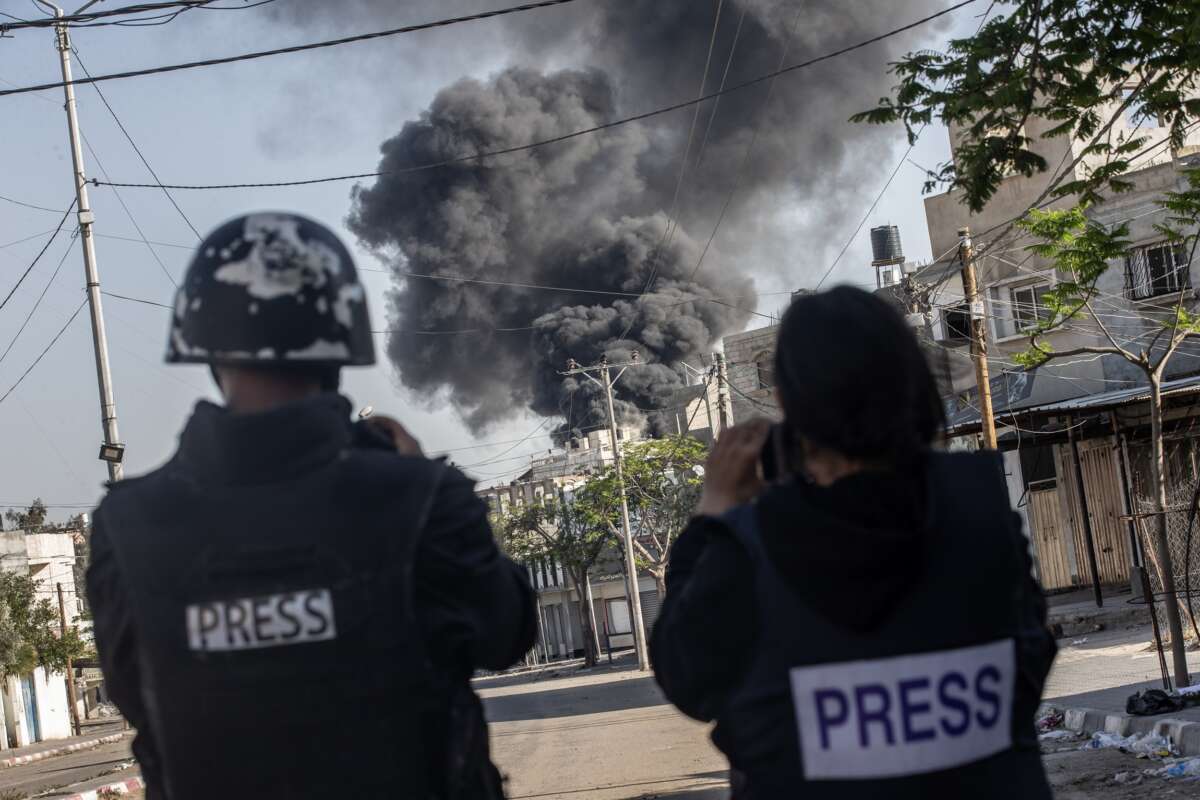Israel’s communications ministry has ordered officials to return broadcasting equipment to The Associated Press after their seizure of the equipment earlier this week was met with widespread condemnation from news organizations.
On Tuesday, Israeli officials told journalists with The Associated Press who had been broadcasting a live feed view of northern Gaza from inside Israel that they had to move their equipment — even though the journalists were in compliance with Israel’s laws on media coverage of its genocide. The journalists running the broadcast were then given a document, signed by Communications Minister Shlomo Karhi, alleging that they had broken a newly-passed law targeting the Qatar-based outlet Al Jazeera.
Israeli officials accused The Associated Press of providing images and reporting to Al Jazeera, which has been a frequent target of Israeli repression due to its reporting on Israel’s occupation of Palestine; earlier this month, authorities raided Al Jazeera’s office in East Jerusalem, confiscating its equipment and temporarily banning it from broadcasting inside Israel.
In actuality, The Associated Press had been sharing the feed with thousands of news agencies around the world, not just Al Jazeera. After giving journalists the document alleging they had broken the law, the ministry confiscated a camera and other equipment being operated by The Associated Press.
Before the equipment’s removal, the livestream had been showing consistent scenes of smoke rising above northern Gaza, where no foreign journalists are allowed to operate due to Israel’s classification of the area as a “closed military zone.”
Israel’s action against The Associated Press was condemned by several international press freedom organizations.
“Banning broadcasters because Israel disagrees with their coverage is the hallmark of an authoritarian state, not a democracy,” said Freedom of the Press Foundation (FPF) Deputy Advocacy Director Caitlin Vogus. “Seizing equipment from The AP just for supplying a news outlet with video footage is disgraceful.”
The Foreign Press Association similarly denounced Israel’s crackdown on journalists.
“Israel’s record on press freedom already has been dismal throughout the war. It has prevented independent access to Gaza for foreign journalists,” the association said in a statement.
Emily Wilkins, president of the U.S.-based National Press Club, lambasted Israeli officials’ seizure of the equipment, saying:
There was no strategic reason for these actions, which are part of a pattern of aggression against journalism organizations by Israel. The lengths to which Israel is willing to go to stop news coverage of the military action in Gaza must not be overlooked by the media still covering the conflict and the public at large.
Notably, White House Press Secretary Karine Jean-Pierre refused to condemn Israel’s action, saying only that it was “concerning” and that the Biden administration wants to “look into it.”
After Israel’s seizure of the equipment was met with international backlash, Karhi announced that he had “ordered that the equipment be returned to The AP news agency.”
The Associated Press celebrated the return of its equipment but noted concerns about Israel’s restrictions on foreign journalists.
“While we are pleased with this development, we remain concerned about the Israeli government’s use of the foreign broadcaster law and the ability of independent journalists to operate freely in Israel,” the company said in a statement.
In addition to escalating its crackdowns on foreign journalists, Israel has consistently attacked Palestinian journalists inside of Gaza. According to a preliminary investigation by the Committee to Protect Journalists (CPJ), as of May 22, Israeli forces have killed 105 journalists and media workers since the start of October. In many cases, Palestinian journalists in Gaza have reported being deliberately targeted by the Israeli military.
“Journalists are civilians who are protected by international humanitarian law in times of conflict,” said CPJ Program Director Carlos Martínez de la Serna. “Those responsible for their deaths face dual trials: one under international law and another before history’s unforgiving gaze.”
Media that fights fascism
Truthout is funded almost entirely by readers — that’s why we can speak truth to power and cut against the mainstream narrative. But independent journalists at Truthout face mounting political repression under Trump.
We rely on your support to survive McCarthyist censorship. Please make a tax-deductible one-time or monthly donation.
